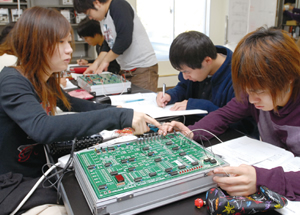College of Engineering


Developing highly skilled science engineers who can contribute to the sustainable society
Today's richly textured society characterized by the Internet, mobile communications systems, reliable and efficient logistics, and secure and comfortable life space has been made possible by technological innovations. We are in need of more people than ever before who can bridge the gap between our lives and the development of science and technology. The Faculty of Engineering at Ibaraki University continues to grow on a global scale and advance into the future as a base for the creation of new scientific engineering frameworks for the coming era without ceasing to cultivate people who can put high-tech engineering into practice to keep nature and people in harmony.
Department of Mechanical Systems Engineering
Cultivating proficient engineers adept at harmonizing ecologically-conscious machinery with computer technology
Contemporary industry epitomizes a tightly interwoven amalgamation of mechanical and computer(system) technology. Mechanical system technology constitutes the fundamental backbone underpinning all sectors of our society. The Department of Mechanical Systems Engineering nurtures adept engineers with converging human- and environment-friendly machinery alongside cutting-edge computer technology. During the initial two years, students delve into basic and specialized subjects. In the third year, students study specialized subjects comprising energy machinery, design and manufacturing, and information machinery programs, along with interdisciplinary topics aimed at conducting experiments, exercises, and cultivating advanced specialized knowledge and application skills in mechanical systems engineering. The fourth year focuses on honing presentation skills and fostering the capacity to resolve intricate challenges through pioneering research.
Department of Electrical and Electronic Systems Engineering
Mastery of technology harnessing the capabilities of electrons and electromagnetic waves for societal benefit
Modern society has undergone a transformation into an Internet of Things (IoT) paradigm, wherein every device, spanning from home appliances to power plants, is interconnected through networks. In the Department of Electrical and Electronic Systems Engineering, a comprehensive curriculum unfolds, commencing with cultivating fundamental academic proficiencies and specialized foundational knowledge during the initial two years. This groundwork paves the way for two distinct educational tracks, deepening specialized basic knowledge during the subsequent third and fourth years. In the energy system program, we aim to develop adept engineers proficient in designing electrical energy infrastructure, notably encompassing power generators within smart grids, using IoT technology, and optimizing the usage of highly efficient electrical energy devices, such as motors and power electronics. Concurrently, the electronics systems program endeavors to nurture specialized engineers capable of innovating cutting-edge electronic devices, particularly those within the realm of IoT, founded upon the amalgamation of the electronic devices and information communication domains.
Department of Materials Science and Engineering
Nurturing adept individuals to spearhead the advancement of next-generation synergistic domains encompassing materials, chemistry, and life sciences
The Department of Materials Science and Engineering is committed to fostering a cadre of researchers and engineers endowed with innovative perspectives and adaptable reasoning, facilitated by a diverse curriculum transcending conventional disciplinary boundaries. During the formative first and second years, students receive foundational education spanning materials science, chemistry, biology, physics, and mathematics. In the pivotal third year, we offer three educational tracks tailored to acquire advanced knowledge and skills. These tracks include materials engineering, applied chemistry, and biotechnology. As students progress into the fourth year, they are assigned to specialized laboratories, where they partake in intensive, small-group education and research guidance. This immersive experience equips them with essential problem-solving skills requisite for societal needs and the competencies demanded by research and engineering domains.
Department of Computer and Information Sciences
Acquire software technology shaping the future of our society
In modern society, computers and the Internet have become indispensable tools across diverse sectors, such as distribution, finance, and manufacturing, with software serving as the rational orchestrator of these functions. The Department of Computer and Information Sciences is committed to providing education and conducting research at the forefront of software technology, aiming to catalyze innovation within the information society. Students study and conduct research in various fields to play an active role and contribute to all areas of the information society. Our students engage in comprehensive studies and research endeavors spanning a broad spectrum of fields, driven by the aspiration to contribute to all facets of the information society actively. Furthermore, students acquire diverse knowledge and cultivate adaptive modes of thinking, positioning them at the forefront of the ever-evolving realm of information engineering. Those aspiring to study Computer Science must engage in broad and logical thinking coupled with effective expression.
Department of Urban and Civil Engineering
Developing engineers dedicated to shaping urban “safety, environment and comfort”
The Department of Urban and Civil Engineering offers a unique fusion of civil engineering and architecture education that distinguishes us from other national universities. Our innovative approach involves collaborative learning between students enrolled in the “Social Infrastructure Design Program” and “Architectural Design Program,” enabling them to enhance their expertise while sharing knowledge. We aim to equip students with the skills necessary to create the three elements of “safety, environment, and comfort” essential for future urban environments. Throughout their study, students will gain a comprehensive understanding of various critical aspects, including regional disaster prevention, strategies for mitigating natural disasters, developing resilient structures, strategies for combating global warming, and technologies for harmonious coexistence with nature. They will also delve into the design; and evaluation of flexible structures, ensuring the sustainability of aesthetically pleasing landscapes and functional spaces in urban planning and transportation systems for potential urban development. Through a cross-disciplinary study of architecture, cities, and the global environment, we endeavor to cultivate civil engineering and construction engineers capable of pioneering a new era, contributing to creating a prosperous and fulfilling life for all.
